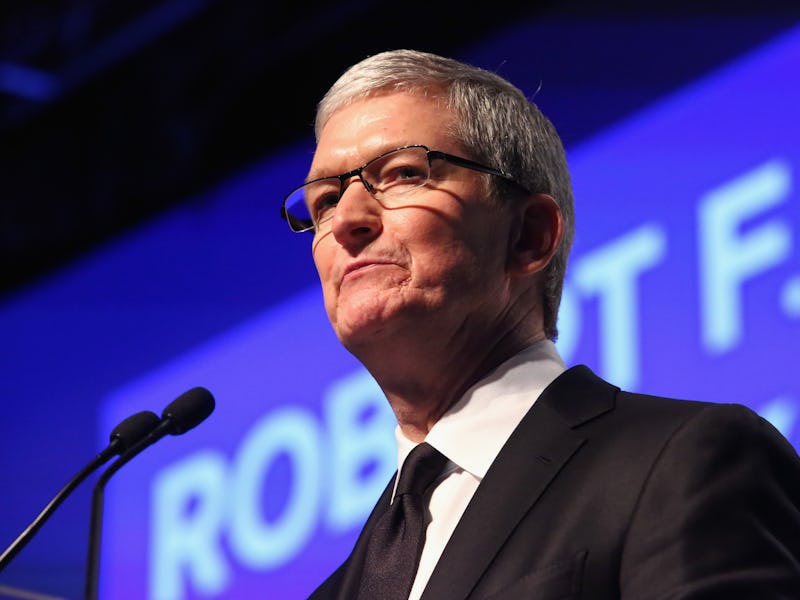Apple Proposes Settlement for FBI iPhone Hack Demand In New Memo
The "most important tech case in a decade" is just getting started.

Apple CEO Tim Cook sent a memo to Apple staff Monday morning, detailing the company’s position in its fight with the FBI over a court order that requires it to build new software that could hack into an iPhone. The particular phone at issue belonged to the couple who opened fire at a San Bernardino holiday party, killing 14 on December 2, 2015.
In Monday’s statement, Cook reiterates his claim that “this case is about much more than a single phone or a single investigation. At stake is the data security of hundreds of millions of law-abiding people, and setting a dangerous precedent that threatens everyone’s civil liberties.”
For the first time, Cook reveals what kind of action Apple would be willing to support to help soothe over the recent stark divide between the company and law enforcement.
“We feel the best way forward would be for the government to withdraw its demands under the All Writs Act and, as some in Congress have proposed, form a commission or other panel of experts on intelligence, technology and civil liberties to discuss the implications for law enforcement, national security, privacy and personal freedoms,” Cook writes.
Apple’s leadership clearly feels that Cook’s “Message to our Customers” defense of Apple’s stance has improved its bargaining position. The memo itself makes no direct reference to a Justice Department report that argued Apple’s defense of encryption seemed “to be based on its concern for its business model and public brand marketing strategy” rather than any principled concern over privacy. But it does point to a new Q&A section posted on Apple’s website that does answer the Justice Department criticism.
Nothing could be further from the truth. We feel strongly that if we were to do what the government has asked of us — to create a backdoor to our products — not only is it unlawful, but it puts the vast majority of good and law abiding citizens, who rely on iPhone to protect their most personal and important data, at risk.
FBI Director James Comey also chimed in Sunday, publishing a blog post criticizing Apple’s portrayal of the FBI’s intentions but also acknowledging the public’s concerns about the agency’s overreach have merit.
“We have awesome new technology that creates a serious tension between two values we all treasure: privacy and safety. That tension should not be resolved by corporations that sell stuff for a living. It also should not be resolved by the FBI, which investigates for a living,” Comey wrote. Nonetheless, he stressed that the FBI doesn’t “want to break anyone’s encryption or set a master key loose on the land.”
While Comey certainly doesn’t back down on the FBI’s request for access to the San Bernardino phone, he seems acutely aware that the agency took a beating in much of the press last week. “We shouldn’t drift to a place—or be pushed to a place by the loudest voices—because finding the right place, the right balance, will matter to every American for a very long time.”
In the meantime, Apple seems poised to consolidate the public good-feeling it engendered last week when it took perhaps the strongest stand yet of any technology company on the issue of government overreach into the privacy of millions of Americans. Cook’s letter cites a “30-year-old Army vet” who told him: “Like my freedom, I will always consider my privacy as a treasure.”
It’s not clear whether Apple can leverage its public support to subvert the priorities of the FBI, which seems determined not only to access this one particular phone, but to demonstrate the feasibility of this legal strategy for future cases. At issue is what some are calling the “most important tech case in a decade,” and it is showing no signs of going away.